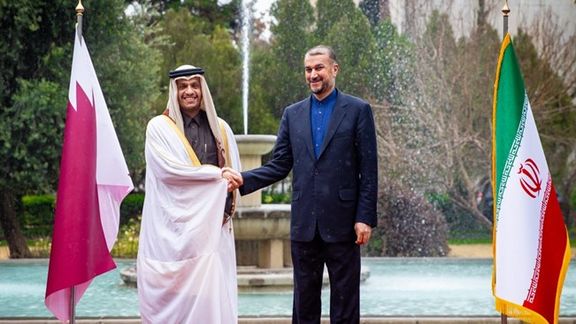Iran Government Agency Says Qatari Visit Not Mediation For Talks With US

Iran's official news agency Thursday said the visit of Qatari foreign minister to Tehran should not be seen as facilitating direct talks with Washington.

Iran's official news agency Thursday said the visit of Qatari foreign minister to Tehran should not be seen as facilitating direct talks with Washington.
Iranian Foreign Minister Hossein Amir-Abdollahian met his Qatari counterpart Mohammed bin Abdulrahman Al-Thani in Tehran Thursday morning, sparking suggestions in domestic and foreign media that Doha was working for direct US-Iran talks to help revive the 2015 Iran nuclear deal.
In a note headlined "Mistaken Interpretation Of Iran, Qatar Foreign Ministers' Visit," IRNA reported “good and close relations” with Qatar but said “speculation” over “direct talks with the US in Vienna,” where multilateral talks to revive the 2015 deal, had “fueled some misconceptions about the nature of the visit.”
The visit was announced Wednesday, two days after two calls between the two foreign ministers. "Two phone calls can be made when relations are close, developments fast, and the issue at hand important," tweeted Hamidreza Dehghani, Iran’s ambassador to Doha.
The IRNA note, published before the Tehran meeting, reiterated Iran’s stance that the central issue in reviving the 2015 deal, the JCPOA (Joint Comprehensive Plan of Action), was the US need to “return to its commitments” under the agreement, which Washington left in 2018 while imposing ‘maximum pressure’ sanctions.
The note stressed that until this happened a US “presence in the meetings of the Joint Committee [of remaining JCPOA members]” in Vienna would be “irrelevant,” and that “the key to solving the problem is [the US] returning to all commitments under the JCPOA, not mediation.”
IRNA went on to note both that some politicians in Iran had been arguing for direct US talks and that Qatari officials had not refuted speculation about mediation as "they want to gain credit" from posing as a mediator. With the meeting between Amir-Abdollahian and al-Thani focused on “regional” issues, IRNA observed, "Qatar's capabilities and record in this regard [mediation] do not confirm such an interpretation."
Among such regional issues are rising tensions over the United Arab Emirates role in the Yemen war, and recent Ansar Allah, or Houthi, missile attacks in the UAE.
But Qatar's emir Sheikh Tamim bin Hamad al-Thani is due to meet US President Joe Biden January 31, where restoring the JCPOA is likely to be discussed. Doha has called on both the US and Iran to respect the terms of the deal.
While Tehran has refused direct talks with the US since Washington left the JCPOA, and has insisted that the Vienna negotiations, which began in April, should remain formally within JCPOA structures with the US taking part indirectly, there have been recent signs that with Vienna process at a crucial point Tehran is reconsidering.
Talks remain controversial
Amir-Abdollahian said Monday that the possibility of bilateral talks with the US would not be "overlooked" if a "good deal with strong guarantees" was within reach. Ali Shamkhani, Secretary of Iran's Supreme National Security Council (SNSC), also raised the possibility in a tweet Tuesday. President Ebrahim Raisi in a TV interview Tuesday also appeared open, if hesitant, over the prospect.
But such talks remain controversial. The flagship hardliner newspaper Kayhan Tuesday criticized Amir-Abdollahian and Shamkhani, demanding an explanation.
Abdollah Ganji, chief editor of the principlist Jahan newspaper, has preferred to insist that any talks with the US should be bilateral and not within JCPOA structures.
While Raisi has continued approach of former president Hassan Rouhani over US participation in Vienna, some Iranian reformists have been recently pushed for direct US talks as the best way to have ‘maximum pressure’ sanctions lifted.
Ali Khamenei, the supreme leader, who endorsed two years of talks with the US leading up to the JCPOA in 2015 and earlier over Afghanistan and Iran, said in January that “negotiations with the enemy at a certain juncture does not necessarily mean surrender."